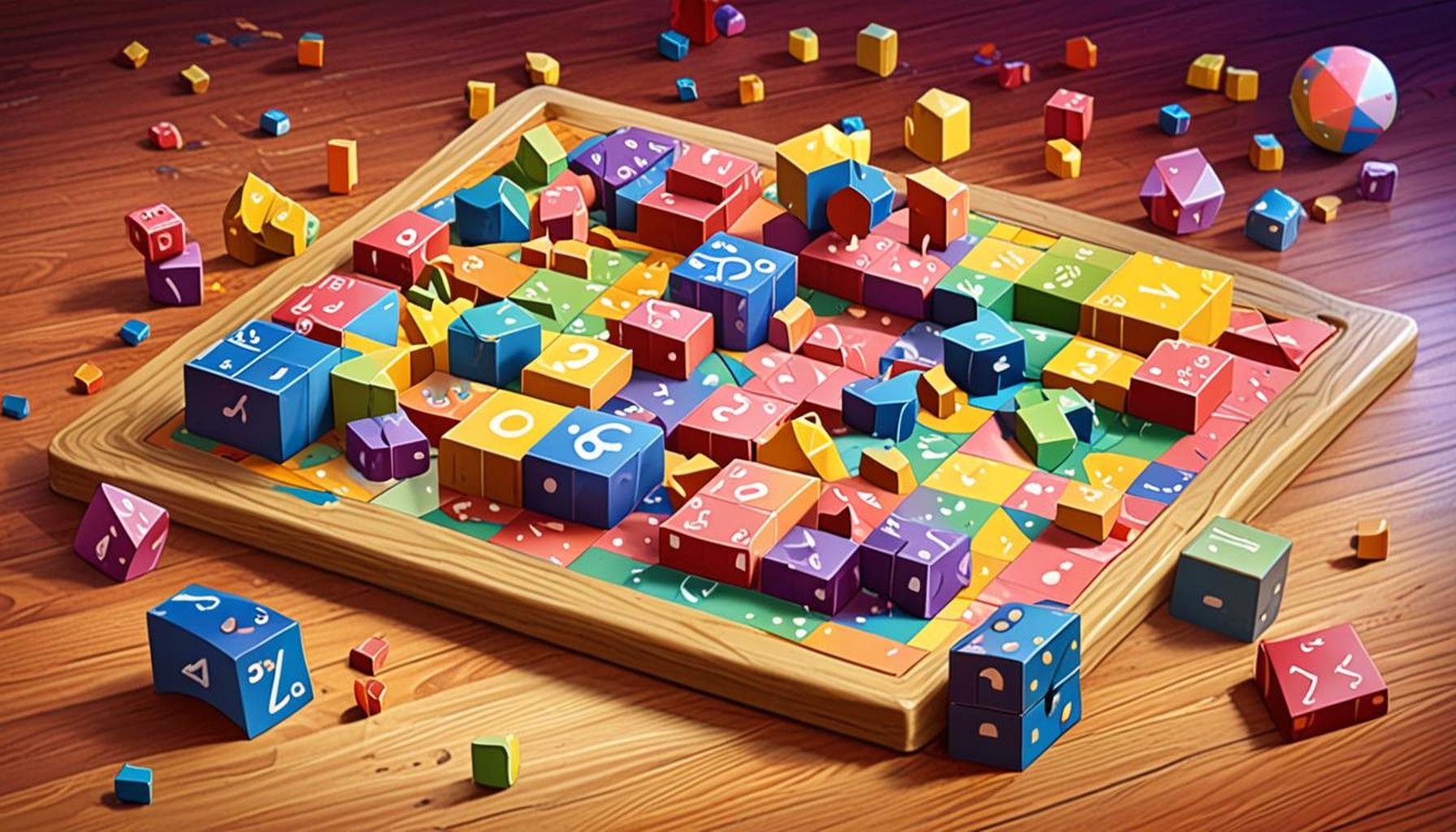Examining the Role of Sudoku in Enhancing Logical Reasoning Among College Students

The Role of Sudoku in Cognitive Development
In an era where mental agility is crucial for academic success, college students often search for effective ways to enhance their cognitive skills. Among the myriad options available, Sudoku stands out as a particularly engaging method for boosting logical reasoning. Its appeal lies not just in its simplicity but in its ability to challenge the mind in multiple dimensions, making it an ideal brain exercise amid the rigors of college life.
Why Sudoku Captivates Students and Educators
The allure of Sudoku isn’t purely based on it being a popular pastime; it’s the profound benefits that come from regular gameplay that have caught the attention of both educators and students. Here are some compelling reasons:
- Problem-Solving Skills: At its core, Sudoku is about problem-solving. Each player must deduce the placement of numbers in a grid through critical thinking and systematic approaches. For instance, students who take on tougher puzzles may find themselves grappling with multiple variables, fostering a sense of determination and resilience.
- Pattern Recognition: The game is fundamentally about recognizing patterns. As students work to fill in the grid, they learn to identify relationships between numbers, enhancing their analytical skills. Such skills are invaluable not only in mathematics but also in fields ranging from science to economics.
- Time Management: Engaging with Sudoku imposes a natural time constraint. Players often aim to complete a puzzle within a set timeframe, which can translate into improved pacing and decision-making under pressure—qualities essential for exam preparations and project deadlines in college.
The Broader Benefits of Sudoku
Aside from direct cognitive improvements, research suggests that regular engagement in mental exercises like Sudoku can yield a plethora of additional benefits:
- Enhanced Concentration: Focusing on a single Sudoku problem cultivates deeper listening and reading skills, allowing students to concentrate more effectively on their coursework.
- Improved Memory: The act of memorizing the rules and strategies of Sudoku enhances memory retention. Studies have shown that such repetitive problem-solving can strengthen neural pathways associated with memory.
- Stress Relief: Amidst the pressures of college life, taking time to play Sudoku can serve as a healthy distraction. It allows students to shift their focus away from academic stress, offering a moment to unwind and recharge.
Integrating Sudoku into a college student’s routine can be a game-changer. With just a few minutes a day, students can reap the cognitive benefits of this number puzzle while enjoying it as a leisurely activity. Given its accessibility through newspapers, mobile apps, and online platforms, Sudoku remains a versatile tool to help sharpen the mind, making it an appealing addition to any academic strategy.
Dive Deeper: Click here to discover more about using mind games for problem-solving skills
The Cognitive Mechanisms Behind Sudoku
As college students navigate their academic journeys, the cultivation of logical reasoning skills is increasingly paramount. Sudoku, the popular number puzzle originating from Japan, serves not only as a mental pastime but as a robust tool for enhancing these very skills. To understand how Sudoku works its magic on the mind, it’s essential to delve into the cognitive mechanisms at play during gameplay.
Logical Deduction and Sequential Thinking
At its essence, Sudoku is a puzzle that requires a player to utilize logical deduction. Each puzzle begins with certain numbers filled in, while others need to be determined based on the fundamental rule: each number must appear only once in each row, column, and 3×3 grid. This core principle leads players through a series of steps that require sequential thinking and reasoning, enabling students to refine their decision-making processes at every turn.
Research indicates that engaging in such structured problem-solving can lead to enhanced logical reasoning capabilities. Specifically, students learn to:
- Formulate Hypotheses: Players often start by making educated guesses based on the existing numbers, akin to scientists crafting hypotheses in experiments. As they test their assumptions and either confirm or eliminate possibilities, students practice hypothesizing and refining their thought processes.
- Analyze Patterns: The nature of Sudoku inherently develops pattern recognition skills. By evaluating how numbers interact within the grid, students learn to anticipate consequences of their placements, further honing their logical reasoning abilities.
- Evaluate Outcomes: Each placement offers a set of outcomes, compelling players to analyze the ramifications of their moves before executing them. This practice nurtures the ability to weigh options carefully—an invaluable skill for academic and professional success.
Studies Supporting the Benefits of Sudoku
Various studies bolster the claim that Sudoku positively influences logical reasoning. A study conducted by cognitive psychologists revealed that individuals who regularly engage in logic-based puzzles, like Sudoku, tend to perform better on standardized tests measuring logical reasoning capabilities. Furthermore, a longitudinal study with college students showed a marked improvement in critical thinking assessments after just a few weeks of regular Sudoku practice.
Moreover, educators are beginning to recognize the potential of Sudoku as more than just a recreational puzzle. Some institutions have started to incorporate it into their curricula, emphasizing its role in developing analytical thinking in conjunction with traditional academic subjects. This growing interest hints at a future where logical reasoning can be systematically nurtured through innovative means, like Sudoku, appealing to a generation of students who thrive on interactive learning experiences.
Thus, the integration of Sudoku into college students’ daily routines presents a unique opportunity not only for entertainment but also for systematic cognitive enhancement, particularly in the realm of logical reasoning. Students willing to invest time in solving these puzzles may find themselves equipped with sharper analytical skills, better prepared to tackle the challenges of higher education and beyond.
| Advantages | Impact on College Students |
|---|---|
| Improved Problem-Solving Skills | Sudoku enhances critical thinking by challenging students to apply logical strategies to solve puzzles. |
| Boosts Cognitive Function | Regular Sudoku practice can lead to better memory retention and improved attention spans, benefiting academic performance. |
| Time Management Skills | Sudoku encourages students to manage their time effectively while solving puzzles under time constraints. |
| Stress Relief | Engaging in Sudoku can provide a mental break from academic pressure, reducing overall stress levels. |
The game of Sudoku serves not just as a pastime but as a powerful tool for enhancing logical reasoning skills among college students. As they navigate through the grid, students are compelled to apply deductive reasoning, enhancing both their analytical and problem-solving abilities. Furthermore, engaging regularly in Sudoku can stimulate cognitive functions, as it requires memory recall and strategic thinking—essential skills for any academic discipline.Importantly, Sudoku encourages the cultivation of time management skills, as students often set time limits to complete a puzzle, mirroring the time-bound nature of exams. This exercise cultivates discipline and pacing, both crucial for academic success. Additionally, Sudoku offers a unique avenue for stress relief. By immersing themselves in the game, students can temporarily escape from academic pressures, promoting overall mental well-being and balance in their busy college lives. In conclusion, the advantages of Sudoku extend far beyond entertainment, proving to be an effective aid in enhancing logical reasoning and fostering skills that are invaluable to students.
DISCOVER MORE: Click here to delve deeper
Sudoku as a Platform for Collaborative Learning
Beyond the individual benefits of playing Sudoku, this engaging game also fosters collaborative learning among college students. As institutions recognize the impact of teamwork on learning outcomes, Sudoku can serve as an innovative medium for students to enhance logical reasoning skills collectively. Engaging in group activities that involve solving Sudoku puzzles encourages dialogue and exchange of ideas, further developing critical thinking skills.
Group Problem-Solving Dynamics
When students tackle Sudoku puzzles together, they experience a unique learning dynamic that promotes several aspects of logical reasoning:
- Shared Strategies: Collaboration allows participants to share their problem-solving approaches. One student’s method may provide insights or alternatives that others have not considered, enhancing the overall understanding of logical reasoning.
- Encouragement of Diverse Perspectives: Each participant comes equipped with different backgrounds, which informs their cognitive approaches. This variety can yield creative strategies to solve puzzles, emphasizing that there is not a single right answer—a valuable lesson in logical reasoning.
- Conflict Resolution: Manifold opinions can sometimes lead to disagreements during collaborative Sudoku sessions. Students learn to navigate these differences through discussions, promoting the development of soft skills such as negotiation and conflict resolution alongside their logical reasoning abilities.
Educational Institutions Embracing Sudoku
Several universities across the United States are taking proactive measures to integrate Sudoku into their educational frameworks, viewing it as a tool for enhancing cognitive skills. For instance, institutions like Stanford University and the University of California, Berkeley, have launched workshops that involve Sudoku as part of their math or strategy game courses. These initiatives are designed to challenge students and test their logical reasoning in a hands-on environment.
Moreover, some professors have begun to utilize Sudoku as a supplementary exercise in statistics or computer science courses. By engaging students in problem-solving activities that require logical connections and reasoning, educators not only reinforce theoretical concepts but also help students to contextualize their learning in a practical manner.
Sudoku Competitions: A Test of Wits and Skills
Additionally, Sudoku competitions are gaining popularity among college campuses, providing students with a platform to demonstrate their logical reasoning skills in a competitive setting. These events not only fuel enthusiasm for the puzzle but also stir camaraderie among participants as they experience the thrill of competition. They foster a spirit of excellence, encouraging students to strive for improvement in their reasoning skills while facilitating stress relief amid academic pressures.
In environments where logical thinking is crucial for success, organizations sometimes partner with universities to organize Sudoku tournaments. Such collaborations underscore the belief that playing Sudoku is not just an idiosyncratic hobby but rather a structured method for honing logical skills essential in various academic fields and future careers.
With the plethora of resources available for players—from mobile apps to online communities—college students can easily access platforms that offer advanced Sudoku puzzles suited to a range of skill levels. This accessibility serves as a compelling factor that can help foster a culture of analytical reasoning within peer groups, further entwining social interaction with cognitive enhancement. As students immerse themselves in the world of Sudoku, the potential for personal and academic growth is undeniable.
DISCOVER MORE: Click here to learn how strategy games enhance critical thinking in seniors
Conclusion: The Multifaceted Benefits of Sudoku in Education
In an era where logical reasoning is increasingly vital for success in academia and beyond, Sudoku emerges as a powerful tool for college students seeking to enhance their cognitive skills. This seemingly simple number puzzle transcends mere entertainment, providing a robust framework for individual skill improvement and fostering collaborative learning opportunities. The distinct advantages that arise from group problem-solving sessions highlight the importance of collective engagement in developing effective logical reasoning strategies.
Moreover, as educational institutions across the United States embrace Sudoku through workshops and competitions, the game’s potential as a legitimate pedagogical tool becomes clear. It not only complements traditional learning methods but also engages students in a dynamic and interactive manner, allowing them to apply theoretical knowledge in real-world scenarios. This shift signifies a recognition of diverse learning styles and the value of hands-on experiences in academia.
As Sudoku continues to gain traction among college campuses, its role in nurturing critical thinking cannot be overstated. By promoting a culture of inquiry and exploration, Sudoku encourages students to approach problems with a variety of perspectives, enhancing problem-solving capabilities that extend far beyond the puzzle itself. In conclusion, Sudoku is not merely a pastime; it is a passport to improved logical reasoning and a vital skill set that prepares students for future academic and professional challenges. With continued research and engagement, the implications of Sudoku’s educational benefits can have lasting impacts on student development and success.


